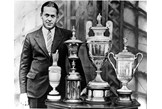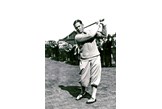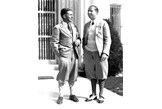Bobby Jones
Published:
After taking your stance, it is too late to worry. The only thing to do then is to hit the ball.
Golf may be a sophisticated game. At least, it is usually played with the outward appearance of great dignity. It is, nevertheless, a game of considerable passion, either of the explosive type, or that which burns inwardly and sears the soul.
The difference between a sand trap and water is the difference between a car crash and an airplane crash. You have a chance of recovering from a car crash.
I shall never forget my first visit to Augusta National. The long lane of magnolias through which we approached was beautiful. The old manor house with its cupola and walls of masonry two feet thick was charming. The rare trees and shrubs of the old nursery were enchanting. But when I walked out on the grass terrace under the big trees behind the house and looked down over the property, the experience was unforgettable. Indeed, it even looked as though it were already a golf course. I liked to sit on the terrace for hours at a time, enjoying the beauty of this panorama.
(Alister) MacKenzie and I managed to work as a completely sympathetic team. Of course, there was never any question that he was the architect and I his advisor and consultant. No man learns to design a golf course simply by playing golf, no matter how well.
I must confess that the prospect of annually entertaining my old playmates and the later arrivals in the upper crust of competitive golf was quite attractive.
When it was first suggested we call the tournament the Masters, I thought the name was borne of a touch of immodesty. However, the tournament is now well entitled to be called the Masters because it has continued to assemble those who are entitled to be called the masters of the game.
There isn’t a hole at Augusta National that can’t be birdied if you just think. But there isn’t one that can’t be double bogeyed if you stop thinking.
Our overall aim at Augusta has been to provide a golf course of considerable natural beauty, enjoyable for the average golfer, and at the same time testing for the expert player striving to better par.
The finishes of the Masters Tournament have almost always been dramatic and exciting. It is my conviction that this has been the case because of the make-or-break quality of the second nine of the golf course. This nine, with its abundant water hazards, each creating a perilous situation, can provide excruciating torture for the front runner trying to hang on. Yet it can yield a very low score to the player making a closing rush.
I had held a notion that I could make a pretty fair appraisal of the worth of an opponent simply by speaking to him on the 1st tee and taking a good measuring look into his eyes.
I have never felt so lonely as on a golf course in the midst of a championship with thousands of people around, especially when things begin to go wrong and the crowds started wandering away.
It is nothing new or original to say that golf is played one stroke at a time. But it took me many years to realise it.
In order to win you must play your best golf when you need it most, and play your sloppy stuff when you can afford it. I shall not attempt to explain how you achieve this happy timing.
In tournament golf, and particularly in an Open Championship, you take an awful lot of mental punishment. Golf is played at such a slow pace that you don’t have an opportunity to work off steam in physical activity. Playing around that golf course, you get so weighted down by the strain and the responsibility and the difficulty of concentrating that you just wish to goodness you could hit a careless shot – just hit the ball without thinking. And if you ever yield to that temptation you’ll always pay for it.
No one will ever have golf under his thumb. No round ever will be so good it could not have been better. Perhaps this is why golf is the greatest of games. You are not playing a human adversary; you are playing a game. You are playing old man par.
You swing your best when you have the fewest things to think about.
No one ever swung the golf club too slowly.
On the golf course, a man may be the dogged victim of inexorable fate, be struck down by an appalling stroke of tragedy, become the hero of unbelievable melodrama, or the clown in a side-splitting comedy.
Considered objectively, it is quite obviously a very simple matter to propel a ball with a stick across some specially prepared ground and into a hole, which is of sufficient size to accommodate it by a good margin. Simple that is, provided there is no limit upon the time or the number of strokes required.
Golf is the only game I know of that actually becomes harder the longer you play it.
Doesn’t it show us all that we are silly little boys or fatuous asses to think that we can play golf without making a lot of bad shots?
I never learned anything from a match that I won.
A leading difficulty with the average player is that he totally misunderstands what is meant by concentration. He may think he is concentrating hard when he is merely worrying.
Fundamentally, there’s just one order of movement that is the most efficient method of hitting a golf ball. You hear an awful lot of talk about the modem swing differing from the swing of 20 years ago. It doesn’t at all, except in the minutest sort of detail. There’s just one basic way a man can hit a golf ball with full power and full efficiency, and it never will be any different as long as he’s just got two arms and two legs. You’ve got to wind up the trunk and lift the arms and cock the wrists. Then you’ve got to use those sources of power in a certain order – unwinding the hips, leading, unwinding the trunk, leading the downswing, pulling with the arms. The final uncocking of the wrists is the culmination of the blow. But you can’t be thinking about all those things and about where you want the ball to go. And where you want it to go is the most important.
Many shots are spoiled at the last instant by efforts to add a few more yards.
If I needed advice from my caddie, he’d be hitting the shots and I’d be carrying the bag.
If I had ever been set down in any one place and told I was to play there, and nowhere else, for the rest of my life, I should have chosen the Old Course at St Andrews.
Bad putting is due more to the effect the green has upon the player than it has upon the action of the ball.
Rhythm and timing are the two things which we all must have, yet no one knows how to teach either.
I get as much fun as the next man from whaling the ball as hard as I can and catching it squarely on the button. But from sad experience I learned not to try this in a round that meant anything.
Golf is the closest game to the game we call life. You get bad breaks from good shots; you get good breaks from bad shots – but you have to play the ball where it lies.
Bobby on the Masters
We are quite willing to have low scores made during the tournament. It is not our intention to rig the golf course so as to make it tricky. It is our feeling that there is something wrong with a golf course which will not yield a score in the 60s to a player who has played well enough to deserve it.
We do not believe that birdies should be made too easily. We think to play two good shots to a par-4 hole and then to hole a 10-foot putt on a dead-level green is not enough.
The contours of the greens have been carefully designed. We have tried to provide each green with at least four pin locations. This does not mean that the pin is always placed in one very definite spot within these areas, but each area provides an opportunity for cutting the hole where the contours are very gentle for a radius of four-five feet all around.
The placement of the flags is one of the most controversial matters in any golf tournament, because it can so drastically affect the difficulty of the play. The exact location is decided by a committee appointed for the purpose. I am sure the players would be interested, too, in having a committee composed of individuals of benign and charitable natures.




